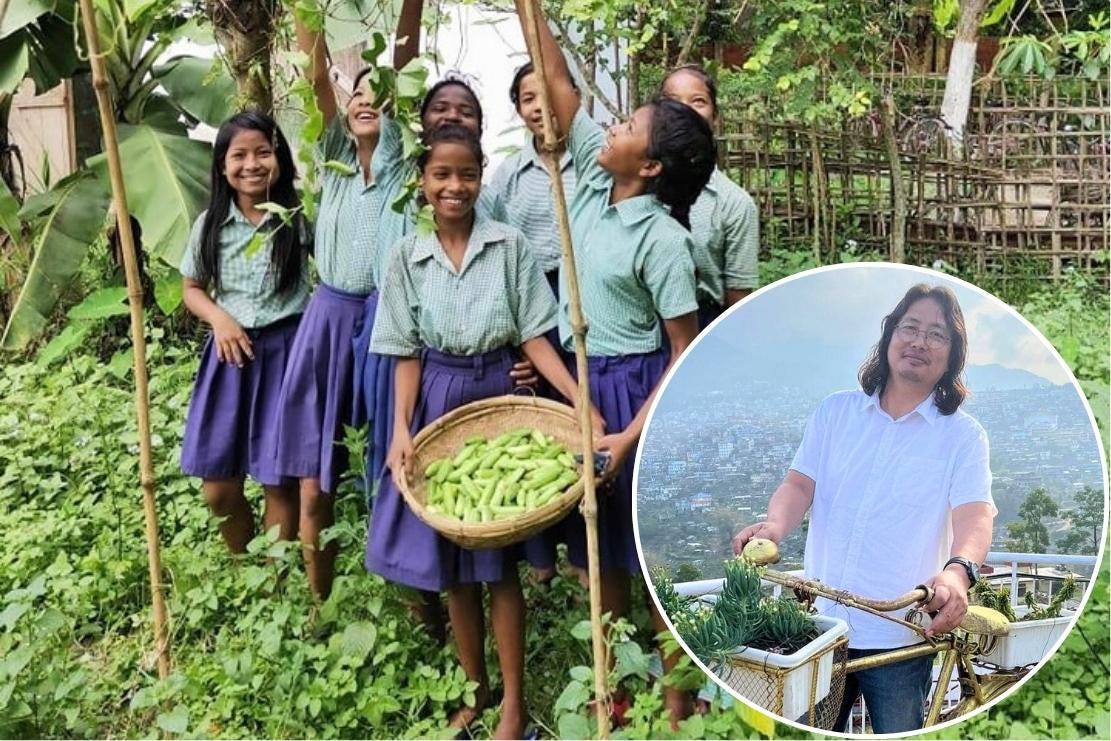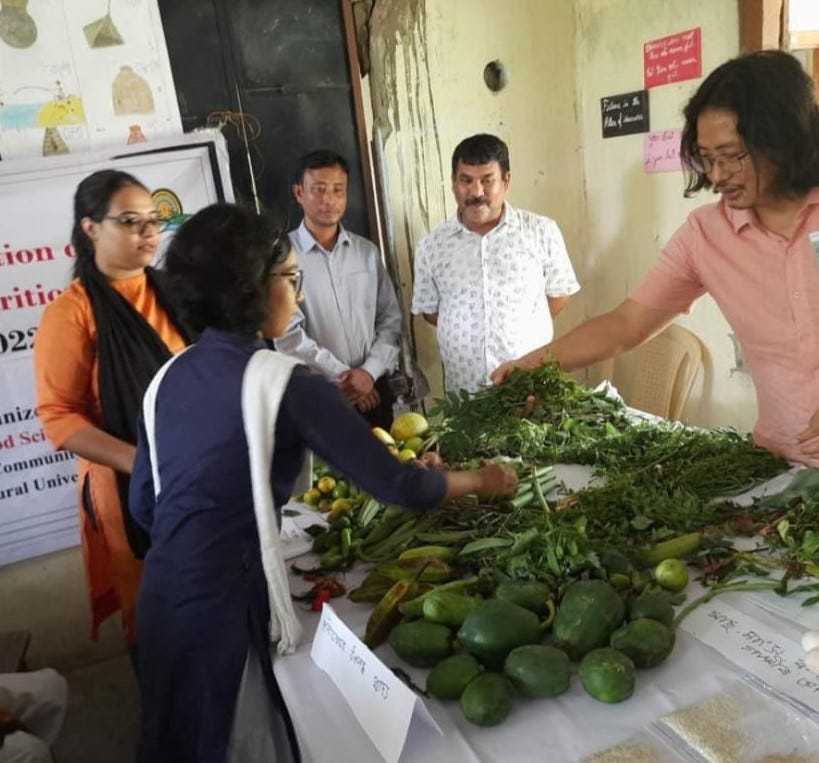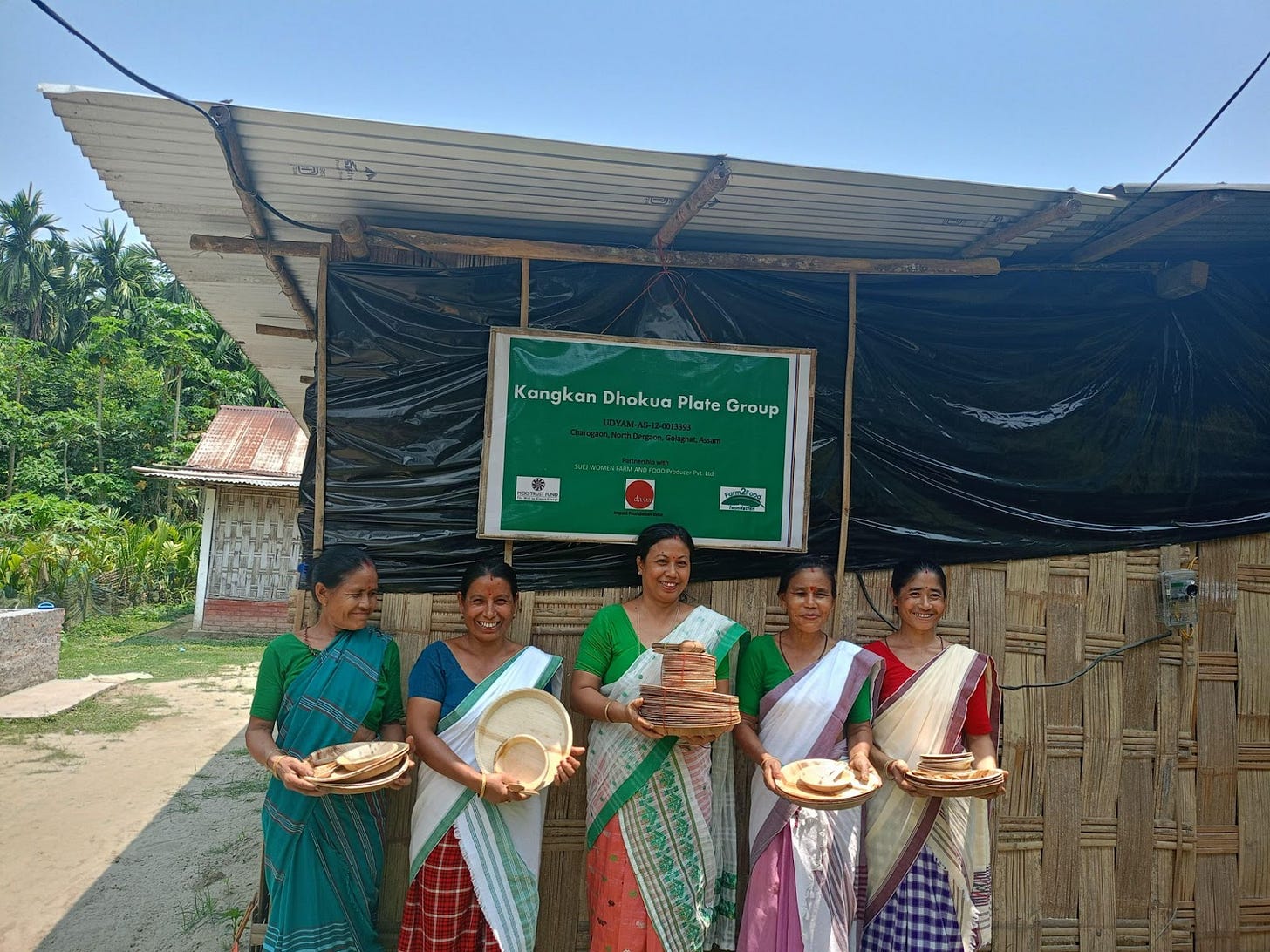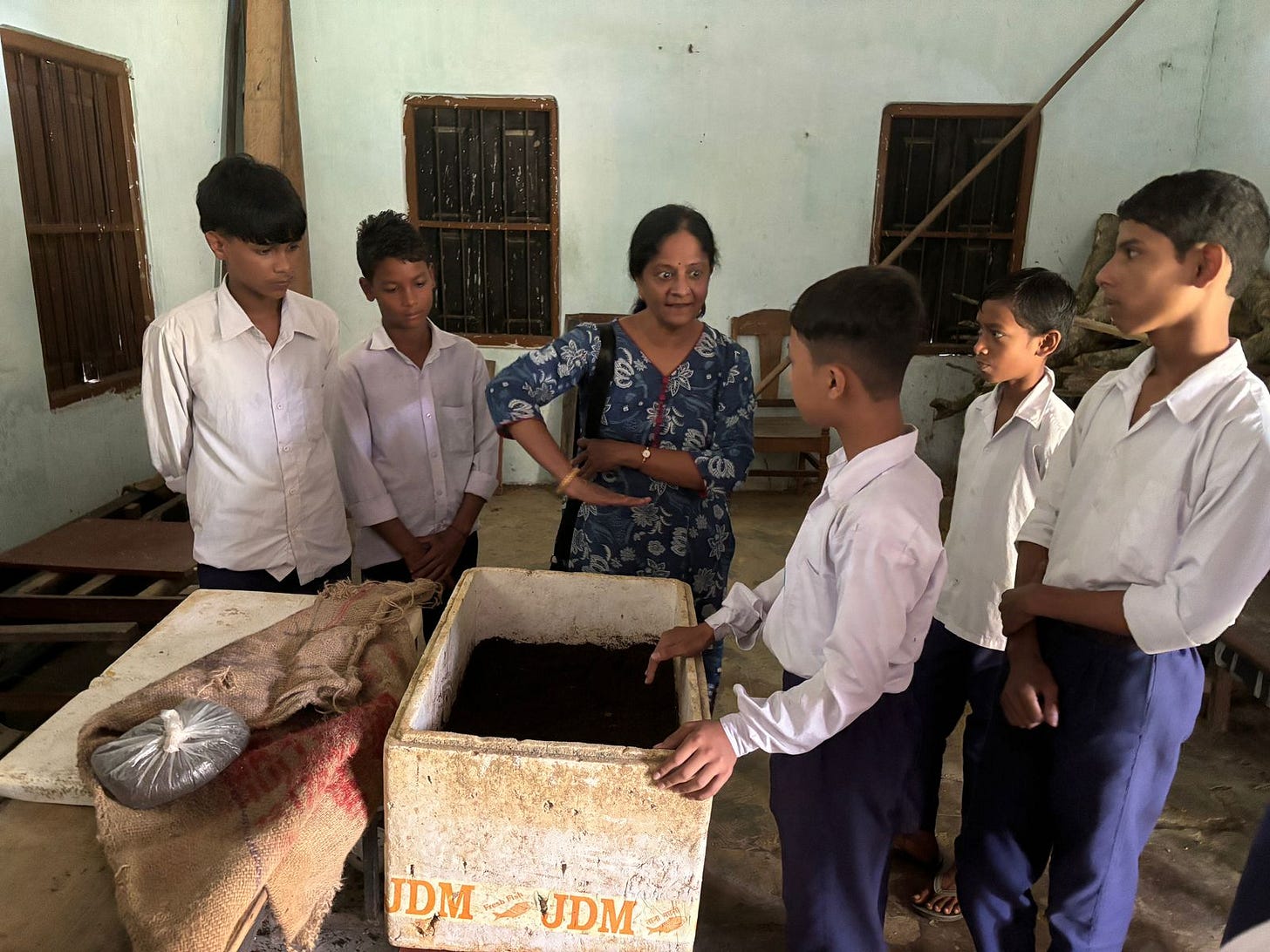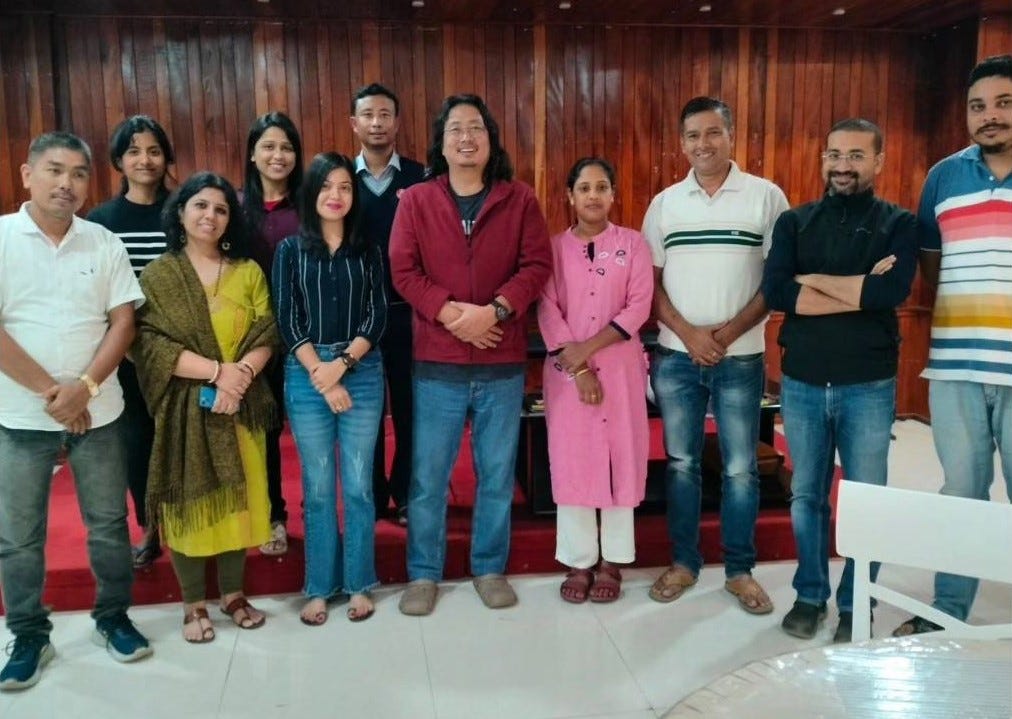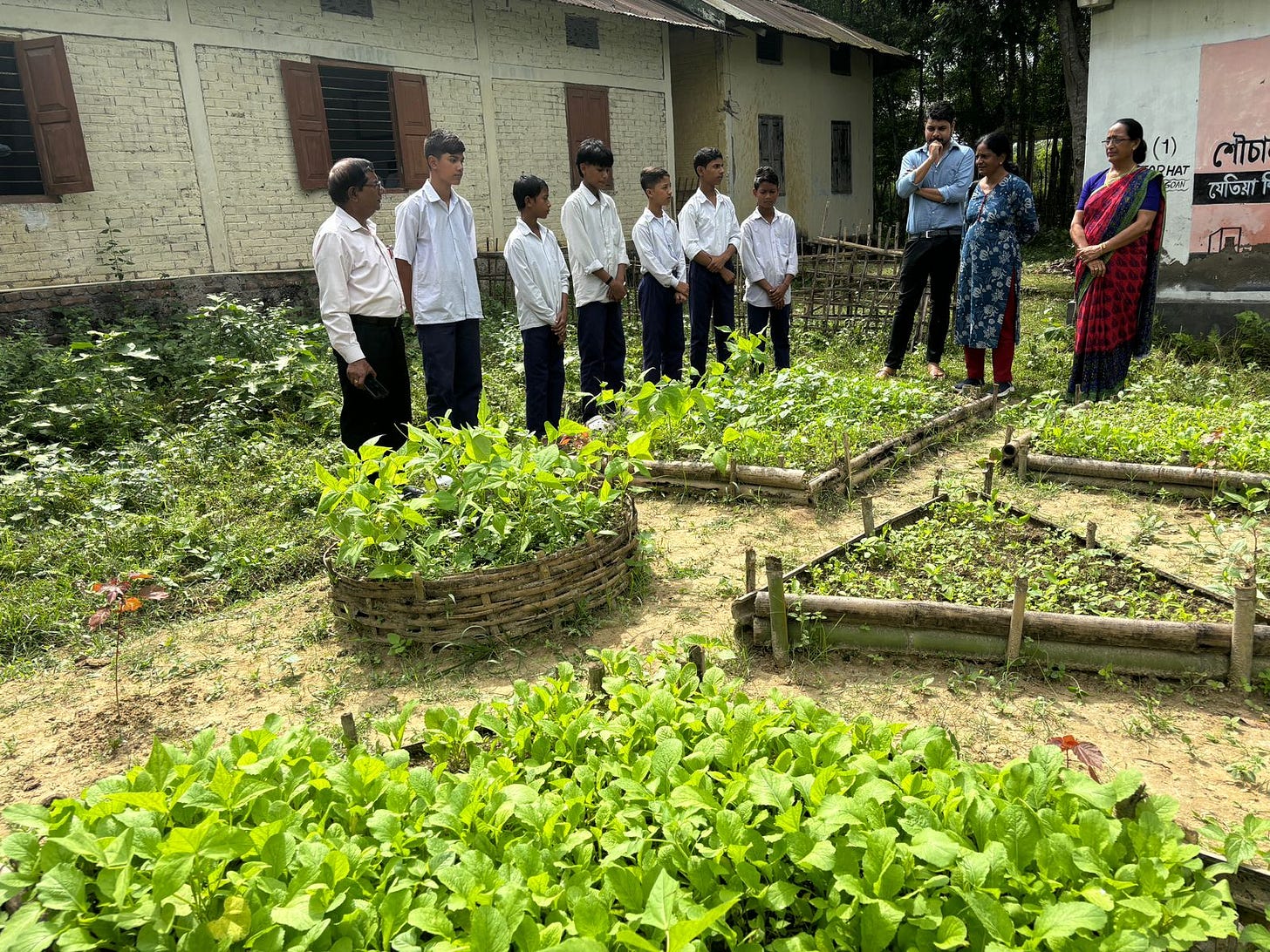Building Farm Entrepreneurs: How Farm2Food is transforming rural Assam
In rural Assam, Farm2Food, led by Deep Jyoti Sonu Brahma, is inspiring young minds to embrace farming as a future, combining education and food entrepreneurship for a sustainable tomorrow.
Snapshot
In the 1980s and 90s, Deep Jyoti Sonu Brahma grew up in Assam, a time when the state was experiencing significant social and political upheaval. The frequent strikes and agitations often brought daily life to a halt, and Sonu noticed how economic challenges drove young people to leave Assam, seeking stability and opportunity outside the state. Rural communities, despite fertile land and rich agricultural heritage, saw minimal support and faced a shift toward unsustainable farming practices. Agriculture was undervalued, often seen as a last resort.
A defining moment came when Sonu observed the disconnect between the younger generation and their agricultural roots, realizing that a change in perception and opportunity could turn agriculture into a meaningful pursuit. Inspired to address the root causes, Sonu launched Farm2Food, an initiative designed to transform Assam’s agricultural landscape by creating opportunities that engage youth through school-based nutrition gardens, entrepreneurship training, and community involvement.
Farm2Food now drives local youth to see agriculture as a viable and rewarding path, blending education, sustainability, and economic empowerment, and believes that youth leadership in the revival of sustainable food systems is one of the major ways to fight climate change.
For the detailed account of Deepjyoti Sonu’s journey, please check out the Deep Dive Full Story section.
Impact at a glance
Over 1,000 schools across India engaged through the School Nutrition Garden program
150+ women farmers trained in organic farming and livestock care, generating sustainable incomes
120,000 students impacted directly, learning hands-on agriculture and nutrition
Two Farmers Producers Organizations (FPOs) established, empowering rural families with additional income
15-20% revival of homestead gardens in rural Assam, encouraging sustainable local food sources
Ashoka Fellowship awarded to Deep Jyoti Sonu for social entrepreneurship excellence in 2015
Dive Deeper: Full Story (6 mins read)
In rural Assam, Farm2Food Foundation has been leading a quiet revolution, reshaping agriculture and inspiring young minds to view farming as a path of opportunity, sustainability, and community pride. Through this journey, ImpactStories.in speaks with Deepjyoti Sonu, founder of Farm2Food Foundation, who shares how the organization has mobilized schools, villages, and families to bring a renewed sense of pride and purpose to local agriculture. Below, Deepjyoti explains the motivation, impact, and future of Farm2Food in a conversation with ImpactStories.in.
Growing up amid Assam's social challenges
"In the 80s and 90s, Assam was like a world of its own,” Deepjyoti recalls, sitting in a small community hall as young children play nearby. "We grew up in a time of unrest. Strikes were common, and businesses would close often. Entire communities faced economic instability, and that led to high migration among young people.” As the son of a farmer in a rural village, Deepjyoti experienced this first-hand, watching young people leave their hometowns in search of opportunities that seemed forever out of reach in Assam.
Despite the fertile land and a rich agricultural heritage, Deepjyoti observed that farming was undervalued and often seen as a ‘last resort’ profession. Large corporations had begun investing in local lands, further discouraging small farmers who felt overwhelmed and outcompeted. "We could see the wealth of our land, but it was slipping through our hands," Deepjyoti tells ImpactStories.in. "Agriculture became more about survival than pride, and that affected how the youth saw it—something to escape from, not embrace.”
This experience led to the seed of Farm2Food, an organization Deepjyoti Brahma and his co founder would later establish to create a renewed culture around agriculture. With support from like-minded individuals, the organization’s vision took shape around transforming agriculture into a respected, sustainable, and financially viable pursuit.
Planting the first seeds: transforming schools into gardens
When Farm2Food first started, Deepjyoti’s goal was simple yet ambitious—create a link between local youth and agriculture. The organization introduced its flagship initiative, the School Nutrition Garden Program, where students grow vegetables on school grounds. The gardens serve a dual purpose, providing nutrition for the school’s midday meal program and hands-on agricultural learning.
"School gardens were a game-changer," Deepjyoti explains, gesturing toward the rows of vibrant plants behind him. "We saw how children connected with these gardens—they learned about the land, saw their hard work turn into real produce, and understood that farming wasn’t just an occupation. It was a way to support their community and themselves.”
In these gardens, students from grades six through eight learned everything from soil preparation to harvesting, with each task connected to their science and math curriculum. "For instance," Deepjyoti explains, "they’d use perimeter formulas for fencing, learn area calculations for plot layout, and understand the life cycle of plants. The garden became a living lab where they could see and feel the results of their work."
Through such initiatives, Farm2Food has connected with over 1,000 schools, engaging around 120,000 students directly. "It’s incredible to see the pride in the students’ faces when they harvest their first vegetables," Deepjyoti says with a smile. "Many of them never imagined they could earn from the land, and now they’re discovering the potential right in their own villages."
Reviving Assam’s agricultural pride
Beyond the students, Farm2Food engages entire communities, knowing well that the ecosystem surrounding the child has an enormous influence. The organization has trained over 150 women in organic farming practices, enabling them to take on roles as farming consultants and livestock caretakers. "These women are more than just farmers," Deepjyoti points out. "They’re mentors, and their success stories inspire others."
For many rural households, livestock serves as a "back-pocket ATM," a resource that can be easily sold in times of need. To protect this income source, Farm2Food teaches local women skills such as vaccination and animal care. "It’s amazing to see how quickly they pick up techniques and then go on to help others in the community,” Deepjyoti says. "A single trained woman can support her family and uplift her neighbors too."
By forming two Farmers Producers Organizations (FPOs), Farm2Food has also created structured opportunities for community members to market their produce and livestock. In fact, the FPOs now produce not only vegetables but also sell sustainable products like goat manure and biodegradable Arecanut leaf plates, offering an alternative to plastic. "The FPOs were a big step," Deepjyoti remarks. "It showed the community that they didn’t need to rely on big corporations to succeed."
In addition to income generation, Farm2Food has also revived the practice of homestead gardening, which had been in decline for decades. "Our communities have seen around a 15-20% revival of homestead gardens, which is just the beginning," Deepjyoti says, proudly. "It’s not an overnight transformation, but a slow and steady return to self-sufficiency."
The impact of influence: turning students into entrepreneurs
One of the most surprising effects of Farm2Food’s work has been the entrepreneurial spirit that it instills in children as young as 13. "When students start seeing a return on their effort, it lights a fire in them," Deepjyoti explains. "Some students earn a small amount from the garden, which plants the idea that they can earn more if they continue learning and growing. For a young girl who makes 10 rupees from her garden, that’s not just money—it’s a step toward her independence."
For many students, these small successes lead to bigger conversations about entrepreneurship. In partnership with their teachers and parents, students are encouraged to sell their produce, using profits to reinvest in seeds or other supplies. "We teach them that you don’t need to be a millionaire to be an entrepreneur. Managing resources well is the real skill," Deepjyoti explains.
Beyond growing vegetables, the students also create their own bio-enhancers and vermicompost, selling these eco-friendly products within their communities. The profits may be small, but the impact is significant.
"For a young girl who makes 10 rupees from her garden, that’s not just money—it’s a step toward her independence," - Deep Jyoti Sonu Brahma.
Recognizing change: awards and recognition
The ripple effects of Farm2Food’s work haven’t gone unnoticed. In 2015, Deepjyoti received the prestigious Ashoka Fellowship, a testament to his dedication to social change. "Receiving the Ashoka Fellowship validated the work we’ve been doing. It reminded us that others also see the importance of agriculture in building a sustainable future," he says.
Farm2Food has also received recognition at various levels, including the Northeast Impact Award 2016 and the Outlook Nutrition Award in 2019, The Glenmark Nutrition Award 2022. "Awards are wonderful, but what matters most is the change we’re seeing in the young people and their families. That’s the true reward," Deepjyoti emphasizes.
Facing challenges and evolving mindsets
While Farm2Food has made great strides, the journey hasn’t been without challenges. "One of our biggest struggles is communicating our impact," Deepjyoti admits. "Funders often want measurable outcomes—numbers, produce volumes, etc.—but how do you measure a young girl’s newfound confidence in growing her own food or a mother’s shift toward sustainable practices?"
Convincing funders that agriculture is worth investing in remains an ongoing challenge. Many funders, Deepjyoti explains, look for quantifiable "quick wins" rather than the slower, systemic changes Farm2Food aims for. "We want to create long-lasting change, but that doesn’t happen overnight,” Deepjyoti says. "A community needs time to trust the process, to let go of old mindsets, and to adopt new ones."
As Deepjyoti gradually steps back from executive duties, passing leadership to younger team members like Sagarika Devi and Partha Pratim Bordoloi, the organization faces another pivotal moment. "Letting go is difficult," he admits. "But for Farm2Food to thrive, it must grow beyond any one person. That’s what I hope to achieve—a self-sustaining ecosystem that will flourish long after I’m gone."
A hopeful harvest: sowing the seeds of a lasting legacy
As Deepjyoti wraps up his conversation with ImpactStories.in, he reflects on the future he envisions for Farm2Food. “Our goal is simple: to make young people see agriculture as an avenue of opportunity and a source of pride,” he says. "We want them to grow up with respect for the land, to see farming as a viable career or even just a life skill they can always come back to."
The work of Farm2Food goes far beyond farming skills; it cultivates a renewed connection to culture, community, and self-reliance. As more communities embrace this vision, Deepjyoti and his team believe that Assam’s youth will not only lead in agriculture but also inspire a ripple effect of sustainable entrepreneurship across the region.
For those who wish to witness the transformative journey of Deepjyoti and Farm2Food, check out the complete impact numbers and testimonials in the sections below.
Make an Impact
Visit Farm2Food: Explore more about Farm2Food, their mission, and ongoing work by visiting https://farm2food.org/
Follow Farm2Food on Social Media: Stay updated and engage with Farm2Food’s work:
Donate or Sponsor:
Sponsor a School Nutrition Garden: With just ₹10,000, you can support a school garden for a year, providing hands-on agricultural education and nutrition.
Support Women Entrepreneurs: Help 150+ women farmers expand their organic farming and livestock care initiatives by contributing to Farm2Food’s programs.
Buy sustainable products like Biodegradable Arecanut leaf cutleries (Plate, bowl, spoon), Goat manures etc
Attend or Volunteer: Participate in community workshops or volunteer your time to help establish school gardens or conduct training sessions for students and women farmers.
Connect with Farm2Food: Have questions or want to contribute? Start a conversation now on WhatsApp.
Encourage Local Schools: Reach out to government schools near you to adopt school nutrition gardens and create sustainable, impactful learning environments.
Share This Article: Spread the word about Farm2Food’s work and inspire others by sharing this article with your friends and networks.
Message from the Founder
If this story resonated with you and you appreciate my efforts in bringing such inspiring stories to light, I would be truly grateful for your support. Your contribution will help me continue uncovering and sharing real stories that are driving change across India.
Sincerely,
Abhilash Shah
ImpactStories
Join thousands of subscribers and get exclusive, uplifting stories of people making a difference—delivered straight to your inbox!
We promise not to spam you—just inspiring content.



